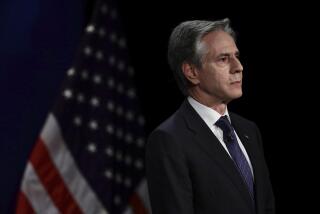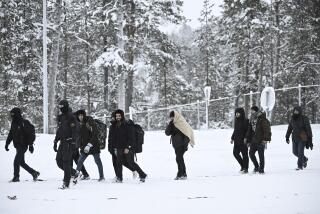Russia says monitors must leave Georgia
- Share via
VIENNA — A team of international monitors is ending its 16-year mission in Georgia after Russia refused to allow an extension of the assignment in a dispute over two breakaway Georgian provinces.
The mission by the Organization for Security and Cooperation in Europe expires Dec. 31, and OSCE chair Finland called a meeting to seek a three-month extension. But talks collapsed when Russia, a member of the group, demanded that the body join Moscow in recognizing the statehood of South Ossetia and Abkhazia.
The dispute came to a head in August when skirmishes over South Ossetia flared into a war in which Russia swiftly crushed Georgian forces. Soon afterward, Moscow recognized both provinces as independent -- and moved to increase military and political control over them.
The OSCE mission, made up of local and foreign staff, includes unarmed military monitors and works on human rights, economic and environmental issues as well as good governance and media freedom. European Union observers will remain in Georgia to monitor an EU-brokered cease-fire. Russia has banned OSCE military monitors from South Ossetia since the end of the war.
“Unfortunately, there was no consensus on this decision” to extend the mandate of the 200-person mission, said Antti Turunen, Finland’s ambassador to the OSCE, after the closed-door gathering. “That means we have to start withdrawal of the mission and cease its activities.”
The U.S. State Department called Russia’s insistence on recognizing the provinces’ independence an effective “veto” of a mandate agreed upon by the other 55 OSCE members.
“Russia’s decision to block the extension of the mission is difficult to justify, given the ongoing tensions and significant humanitarian concerns in the region,” State Department spokesman Sean McCormack said.
Britain also issued forceful criticism. But Russian envoy Anvar Azimov said the independence of South Ossetia and Abkhazia was a reality.
Georgian Deputy Foreign Minister Giga Bokeria said Russia was challenging not only his country’s sovereignty and independence, but also international law and institutions. “It’s basically a statement that the Soviet Union is back,” he said.
More to Read
Sign up for Essential California
The most important California stories and recommendations in your inbox every morning.
You may occasionally receive promotional content from the Los Angeles Times.













